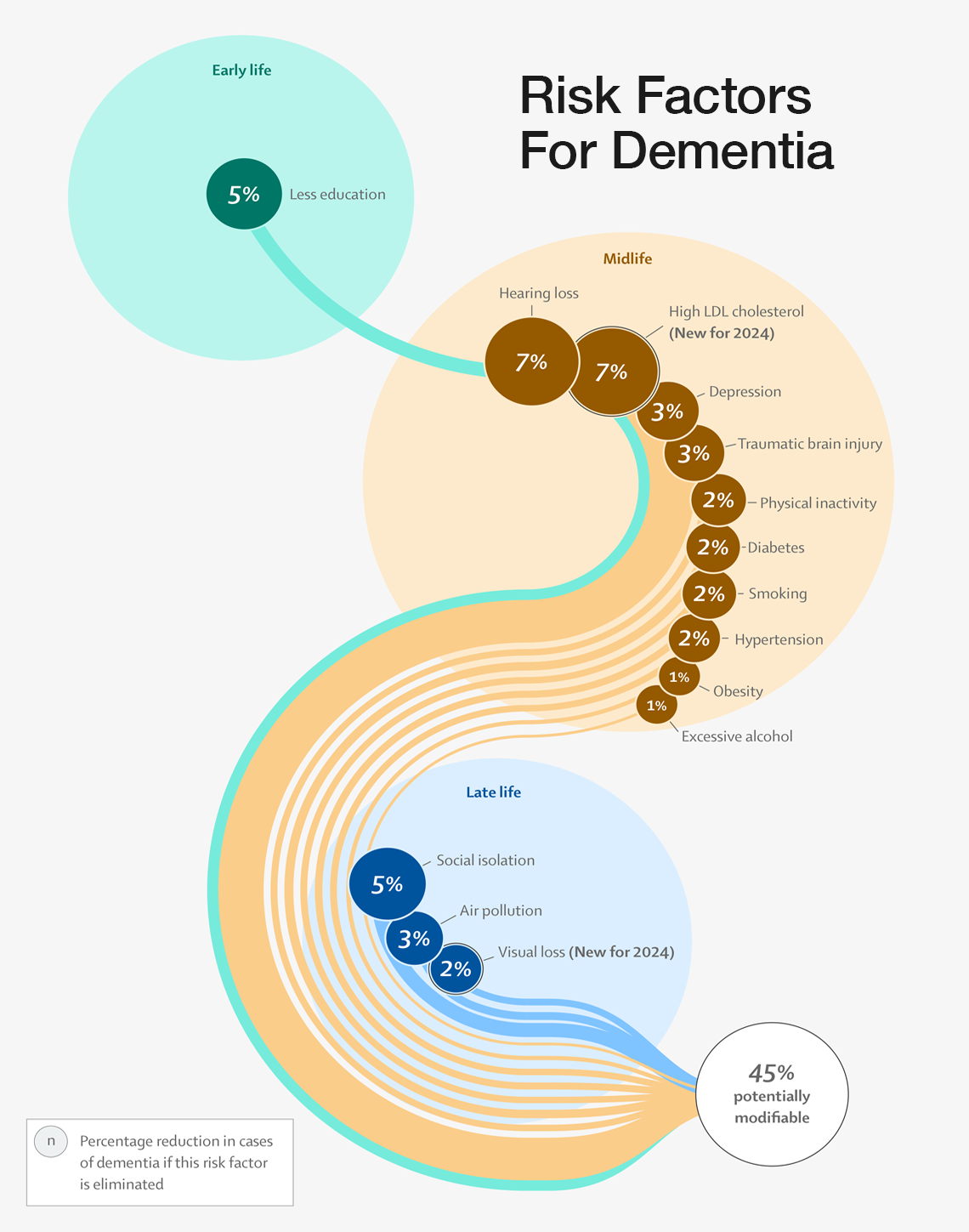AARP Hearing Center


A renowned group of researchers has just handed us two more ways to reduce our risk for dementia. If we can take those actions, and chip away at a dozen other risk factors, a substantial number of dementia cases could be delayed or prevented. Those risk factors are associated with up to half of all dementia cases.
When the group of doctors, epidemiologists and public health researchers collectively known as the Lancet Commission on Dementia Prevention, Intervention and Care first suggested in 2017 that you could cut your risk for dementia by altering some key lifestyle habits, it was unexpected. Could eating healthy, exercising more, going light on alcohol and amping up our social lives, plus a few other actions, really guard against cognitive decline?
Surprisingly, yes. And the health care heavy hitters on the Lancet Commission have a mountain of research to back up their claims.
“A lot of people … thought it was extremely radical,” says Gill Livingston, M.D., Lancet Commission lead, professor of psychiatry at University College London and a member of AARP’s Global Council on Brain Health. But the evidence has grown over the years, she says.
The Lancet Commission’s latest report, released in July, now lists 14 modifiable risk factors, things you can actually do something about (although some risk factors are arguably beyond an individual’s control). The two new risk factors are untreated vision loss and high LDL cholesterol.
“The data is pretty clear that managing a lot of these risk factors [in midlife] can have a fairly significant impact on dementia risk later in life,” says Ian Grant, M.D., assistant professor of neurology at Northwestern University School of Medicine, who was not on the committee.
“People with healthy lifestyles … were shown not only to have a lower risk of dementia than those with less healthy lifestyles but also to have dementia onset delayed … resulting in more healthy years and fewer years of illness,” the commission wrote. And for people with dementia, these lifestyle changes can “help maximize physical health and improve quality of life.”
Here’s the list of 14 modifiable risk factors, along with what you can do about them.
1. Untreated vision loss. Get your annual eye exams.
One of two new risk factors in the Lancet Commission’s 2024 report, untreated vision loss is arguably the most confounding. How can it lead to cognitive impairment?
“Any kind of what we call primary sensory loss — like vision — is bad for the brain because the brain doesn’t like a lack of input,” Grant explains. “That stimulus into the brain is important for maintaining certain connections.”
The Lancet Commission’s report found an increased risk for dementia associated with two common vision problems: cataracts, a clouding of the lens, and diabetic retinopathy, caused when excess sugar in the blood damages blood vessels in the back of the eye. When those problems are corrected, the risk drops dramatically. More than half of people with diabetes will develop diabetic retinopathy, the leading cause of blindness in working-age adults.
2. Hearing loss. Have your hearing checked and get hearing aids if needed.
The Lancet Commission considers hearing loss the single biggest modifiable risk for dementia. Why? “Hearing loss may impact dementia risk by reducing overall neural stimulation and by reducing social interaction,” says Jessica Caldwell, director of the Women’s Alzheimer’s Movement Prevention and Research Center at Cleveland Clinic. “It’s also possible that hearing loss and dementia have a common cause, such as [changes in the small blood vessels of the brain].”
Less than a third of people 71 and older with hearing loss use hearing aids, according to a July 2023 JAMA study. Yet use of hearing aids appears to be particularly effective at protecting cognitive well-being, according to a July report from AARP’s Global Council on Brain Health.
































































More From AARP
Is Age-Related Cognitive Decline Inevitable?
We slow down on some thinking skills, but most people will never have dementiaAARP Staying Sharp
Visit AARP® Staying Sharp® to learn more about the six pillars of brain health
What Causes Dementia?
There’s still much to learn about why dementia happens, and the list of risk factors is longRecommended for You